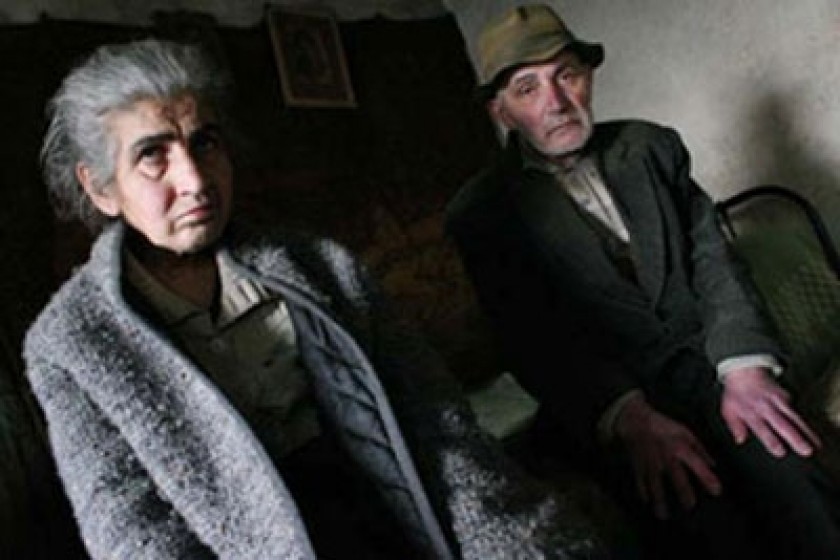
Strangers in Their Homeland
Few people know the Tutunjyan family in Berd. Nobody visits them, except for Hanna, a German nun. Anahit Tutunjyan eats in the soup kitchen that Hanna runs, and brings warm food home for Harutyun. The brother and sister depend on the soup kitchen, since their monthly income is comprised of a 5,000-dram pension and a 7,000-dram stipend.
Harutyun and Anahit Tutunjyan were born in the Iraqi city of Mosul. They immigrated to Armenia in 1947. Harutyun described in detail how the family made the decision to come to Armenia and how they ended up in the town of Berd in the Tavush Marz.
With their whole family - father, mother, aunt, and sister-the two children traveled to Beirut, they boarded a ship for the port of Batumi. Harutyun was twelve years old, and Anahit was two. Starting when he was young, Harutyun has recorded his life story in dozens of notebooks and folders.
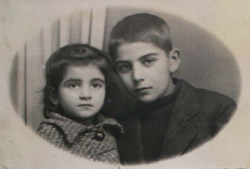 |
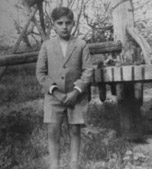 |
| Harutyun and Anahit as children. Mosul, Iraq | |
"On December 5, 1947 we arrived in Armenia, specifically its forested part - a place in the Tavush Marz called Aghsu. We stayed in the forest for four years. In 1951 my father came and we moved, except for our aunt who stayed there one more year," Harutyun wrote.
 |
| Repatriation, 1947 |
The files that we were given contain Harutyun's diary starting from 1952.
"It was immigration. Thousands heeded the call of the motherland, and so did we. My father, Sargis Tutunjyan, was from Kharberd, my mother was from Erzrum. During the Genocide, Arabs captured my fourteen-year-old mother. They tattooed her face and pierced her nose according to their traditions. My mother stayed with them for several years. My aunt's teacher was also with those Arabs. Afterwards, her teacher's family found out where she was and came to take her back. The teacher wrote a note saying that the daughter of Azarikents, that is, my mother, was located in such and such a place. She sent the note to my aunt. My aunt was a nurse in the British hospital in Baghdad and many people knew her. My aunt negotiated and bought her sister back," Harutyun recalled.
 |
| Parents and relatives of Harutyun and Anahit. Western Armenia |
"I had three uncles. I knew where one of them was living, but the other two, I didn't know where they were. We stayed in touch with my one uncle, until he died. In 1965 he visited us with his family. They live in Massachusetts, in the town of Lawrence. When my uncle was alive, we used to exchange letters. His sons didn't know Armenian, and now I don't know what they're doing.
"My father was from the village of Mazra in Kharberd. When [his brothers] reached the age for military service, my grandfather sent them abroad so they wouldn't have to go to the Turkish Army. So my father was the only one who was left. The Turks killed his parents, and my father was alone. My father's aunt was a midwife. The Turks did not touch her-she was considered an important person. She saved my father and then they went with a caravan and somehow arrived in France. After living there for five years he went to Mosul in Iraq.
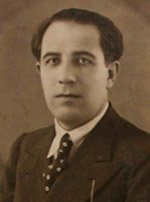 "My mother's family name is Azaryan. Her family emigrated to Russia. We have relatives there but we don't know where they are. For some time, our aunt would write them letters, but afterwards she destroyed everything out of fear - photos, letters. My mother's grandfather was from Erzrum. He had a textile shop," Harutyun continued the story of his ancestors.
"My mother's family name is Azaryan. Her family emigrated to Russia. We have relatives there but we don't know where they are. For some time, our aunt would write them letters, but afterwards she destroyed everything out of fear - photos, letters. My mother's grandfather was from Erzrum. He had a textile shop," Harutyun continued the story of his ancestors.
The entries related to his childhood are the happiest in Harutyun's mostly sorrowful diary-he had many friends in school, ate ice cream, and played with toys.
"We went to school at the Armenian College. 'Armenian girls are beautiful and sweet...' 'The Armenian soil is beautiful...'. Songs like these would capture one's imagination," Harutyun remembered.
In Armenia the Tutunjyan's family was sent to Berd-Harutyun's father was a photographer and the town needed one.
"We were taken to the forest, there was a house that had just been built-the doors weren't even hung yet. We lived there for four years. My sister had asthma. She didn't receive medical treatment and she stopped growing, she never recovered. I contracted a strange disease there. I still don't know what it is," Harutyun wrote.
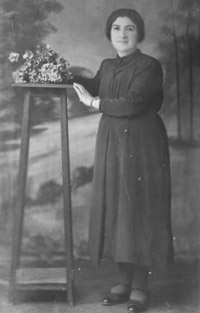 His photographer father was given the job of forest accountant. He had to count the trees that were cut down and taken out of the forest.
His photographer father was given the job of forest accountant. He had to count the trees that were cut down and taken out of the forest.
"What was I doing? I, a city child, with a paint can in one hand and a homemade brush in the other, would follow the forest keeper. He would peel off the bark with a small axe, and put a stamp on the tree-I would paint in a number on each tree. By the way, the paint was reddish...
"We would walk in the forest from dusk till dawn selecting trees...
"O Armenians all throughout the world, here is your homeland, as it truly is, while you are on foreign, unknown shores. We were also like you-our homeland was strange, unfamiliar to us, and now it is just like a fairy tale, if, of course, one can call where one is now a fairy tale, " the young Harutyun wrote in his diary...
After four years, his father moved the family out of the forest to the town of Berd. But Harutyun's sister was already irreversibly sick, and everyone was demoralized. "I had a disease. According to medical opinion, it was something related to hormones and puberty, but according to me it was also connected with the homeland and the forest. Also the atmosphere and lies of this world...My sister had asthma, which if treated at the time would not have had such dire consequences...
"This was our homeland, the country of the Armenians, but much-needed care and human treatment existed only on paper, and in rallies and news reports - only for show and propaganda. If we had nor been treated so carelessly, or as was said at the time, with such indifference, then we would have had that which we sorely lacked, " wrote Harutyun.
"Why did you come here? Was it bad where you came from? Were you forced to come? What is the reason that you came?" Harutyun constantly sought answers to these questions in his diary and sometimes he found them. "The reason was love of the homeland, homesickness, our nationality, and immigration..."
Harutyun had attended Mosul's Armenian College for eight years. "In the forest, there was no school, so I went to Berd where I went to school for three years - fifth, sixth, and seventh grades."
Harutyun never fully fit into life in Armenia. "We were called akhpars here, our life didn't work out. We lived long, dark years. This is how we spent these dark years," he wrote.
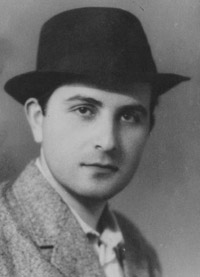 |
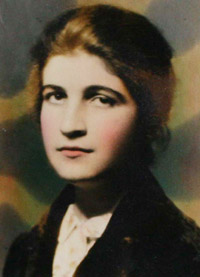 |
| Harutyun and Anahit Tutunjyan when they were young | |
"And so, sister and brother, we live in this homeland. Should we complain? Those who choose to leave, leave, and those who chose to stay, stay. We stayed. This is how we live. There is no other way for us to live. Over there is something called foreign; here is something called the homeland. We are here, while Armenians are spread throughout the world. They are patriots, yet they stay far away amidst the unknown, the unfamiliar.
"And here, in the Armenian homeland, there aren't the things that are necessary to us. How can we complain? It's our beloved homeland. How would you look at us if we complained? In a bad light, of course. You can't say your homeland is bad. How can this be understood, Oh Lord?" Harutyun mused.
"I have lost all hope. I haven't slept for three months now. There is no more hope. I have waited so long. We are in a horrible condition. My brother still doesn't see that we're finished, our lives are over," said Harutyun's 61-year-old sister. "My brother is stubborn. I told my father to find him a wife. I told him, let's go somewhere. I told him, we are alone, let's find a solution, sell the house and leave."
Anahit told us that her brother never accepted their situation, and wanted to leave Armenia.
"I told him to stop thinking about going abroad, it was better to go to Yerevan. We were cut off from life. He was like a little child. He never understood. Isolation is happiness to him. I got sick in the forest. The medicine affected me and it stunted my growth. He didn't understand that we needed to get close to the people here," Anahit said sadly.
Their aunt was the first to die, and then their mother. When their father died, they remained alone, with no ties with the locals, unwilling to accept their fate.
"When my father died, I told him, Harutyun, do something so that you won't turn the house into a ruin. Start a family. I'm used to having family around. He neglected our life. I am so angry at him. He told me it was too late," Anahit said.
Harutyun constantly scolds his sister. He feels guilty towards her, but has nothing to offer in response.
"You know, Hovnanian is building houses; maybe there is a place there. He himself is an Iraqi Armenian; maybe he will help us," Harutyun said.
"The years have gone by so quickly. We feel pain in our souls. We are so alone, we need family," Anahit repeated.
Several years ago their late uncle's sons sent Harutyun and Anahit $200.
"They sent $200 and that was it. They think that we only miss them for the money. They don't understand that we are alone here and miss our family. We are alone here since our parents died," said Harutyun.
"We haven't had a television for many years now. It broke, and stayed that way. For several months now, the radio's been broken, too, " reads a journal entry from 2000.
When the family first moved into their new house, the KGB came and searched the house on several occasions. Their father was interrogated, but fortunately, the Tutunjyans weren't sent to the gulag like many other Armenians who immigrated at the time. In his diary Harutyun wrote that they had a secret place where they hid the photos and Armenian magazines they had brought from Iraq.
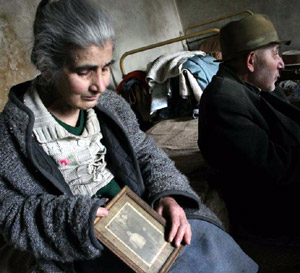 "After many years and many events, on one of the days when only two of us remained, Anahit got angry and took out and destroyed the combined second and third issues of The New Path [the issue devoted to immigration to Armenia] published in Beirut. What can I say? It shook me and it would have been better if it remained, but it received the punishment it deserved. On the cover of the magazine was the famous painting with Stalin in the center that those who were coming back home brought with them as a token of their gratitude. Surrounding the photo were dozens of other photos related to immigration. The issue contained articles by community leaders and other famous people, with their photos. There was a selection of poetry and songs devoted to the longing for and love of the homeland."
"After many years and many events, on one of the days when only two of us remained, Anahit got angry and took out and destroyed the combined second and third issues of The New Path [the issue devoted to immigration to Armenia] published in Beirut. What can I say? It shook me and it would have been better if it remained, but it received the punishment it deserved. On the cover of the magazine was the famous painting with Stalin in the center that those who were coming back home brought with them as a token of their gratitude. Surrounding the photo were dozens of other photos related to immigration. The issue contained articles by community leaders and other famous people, with their photos. There was a selection of poetry and songs devoted to the longing for and love of the homeland."
When she burned up the magazine, his sister seemed to have burned up their past.
Harutyun's last diary entries were made in 2003. Here is an excerpt: "If only if we could go somewhere nice for three months during the winter. This is a necessity, a matter of health. There is one thing about changes and new things. They are nothing, they are always the same. Life is routine; the years are monotonous, monochromatic."
Photos by Onnik Krikorian
 Videos
Videos Photos
Photos




Write a comment